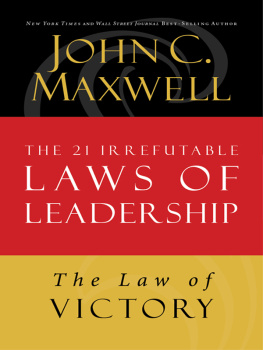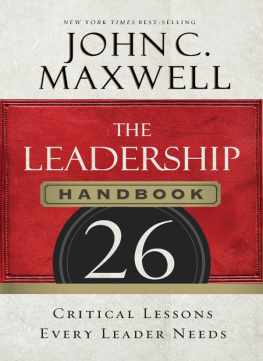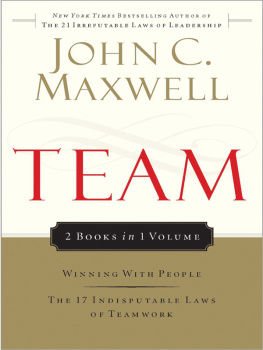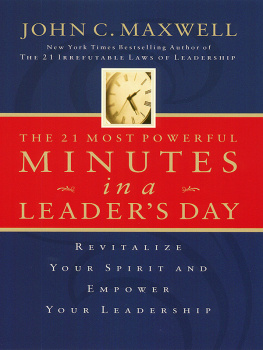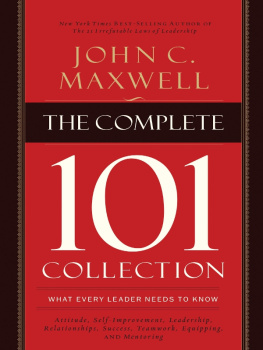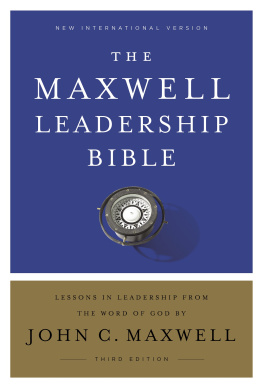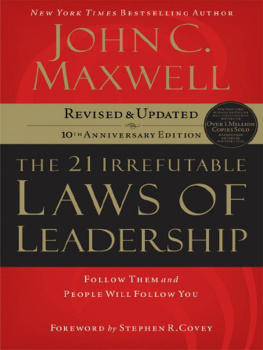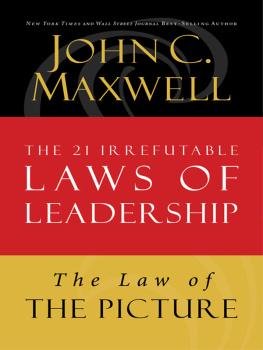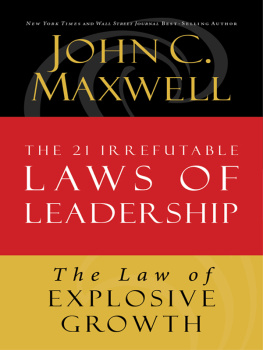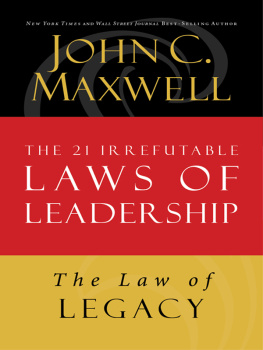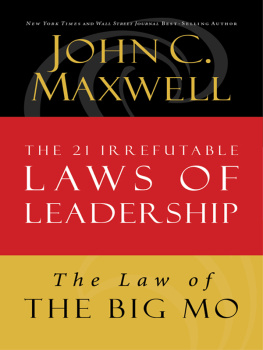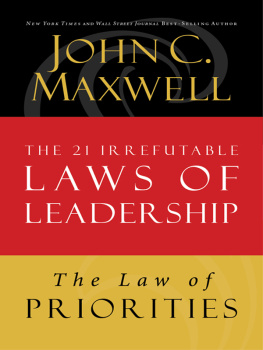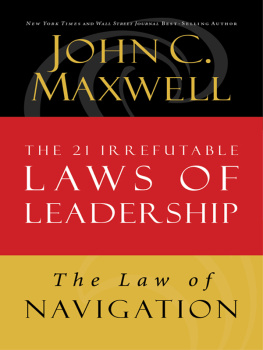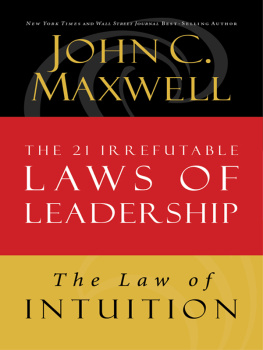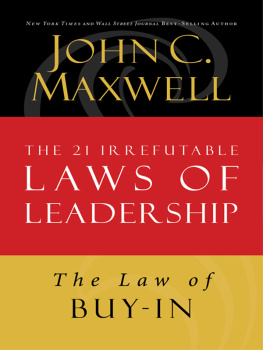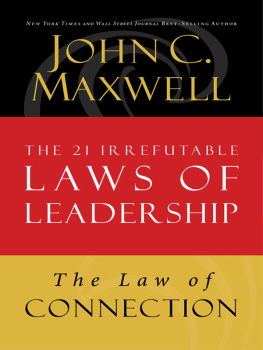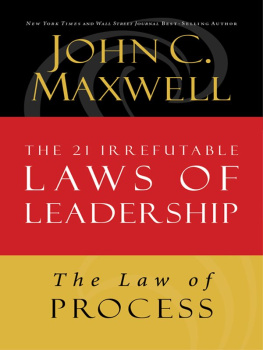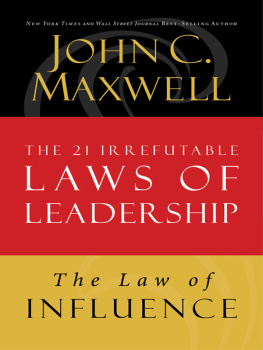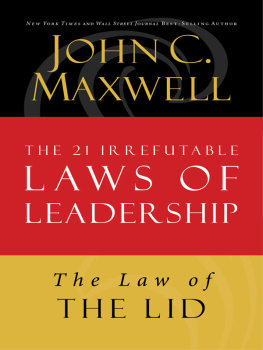
1998 and 2007 by John C. Maxwell
This ebook is derived from The 21 Irrefutable Laws of Leadership, by John Maxwell, 1998 and 2007 by Maxwell Motivation, Inc., a Georgia corporation.
All rights reserved. No portion of this book may be reproduced, stored in a retrieval system, or transmitted in any form or by any meanselectronic, mechanical, photocopy, recording, scanning, or otherexcept for brief quotations in critical reviews or articles, without the prior written permission of the publisher.
Published in Nashville, Tennessee, by Thomas Nelson. Thomas Nelson is a trademark of Thomas Nelson, Inc.
Thomas Nelson, Inc. titles may be purchased in bulk for educational, business, fund-raising, or sales promotional use. For information, please e-mail SpecialMarkets@ThomasNelson.com.
Published in association with Yates & Yates, LLP, Attorneys and Counselors, Orange, California.
Scripture quotations noted CEV are from THE CONTEMPORARY ENGLISH VERSION.
1991 by the American Bible Society. Used by permission.
Scripture quotations noted The Message are from The Message: The New Testament in Contemporary English. 1993 by Eugene H. Peterson.
ISBN 978-0-7852-7431-5 (HC)
ISBN 978-1-4185-3831-6 (ebook)
ISBN 978-1-4002-7574-8 (ebook of Chapter 15)

This book is dedicated to Charlie Wetzel, my writing partner since 1994. Together weve written more than forty books, and Ive enjoyed our collaboration on every one. As I have labored to add value to others by identifying and teaching leadership principles, Charlie, you have added value to me and my efforts. Your insights and skills as a wordsmith have been enjoyed by millions of readers. As a result, you have made a greater impact on more people than has anyone else in my inner circle. For that I thank you.
CONTENTS


Thank you to the thousands of leaders around the world who learned and sometimes challenged the laws of leadership, thus sharpening my thinking.
Thank you to the team at Thomas Nelson who gave me the chance to revise and improve this book, and especially to Tami Heim for her strategic leadership and to Victor Oliver who was instrumental in the development of the original concept.
Thank you to Linda Eggers, my executive assistant, and her assistant, Sue Caldwell, for their incredible service and willingness to go the extra mile every day.
Thank you to Charlie Wetzel, my writer, and Stephanie, his wife, with-out whose work this book would not have been possible.

Leaders Find a Way for the Team to Win
Have you ever thought about what separates the leaders who achieve victory from those who suffer defeat? What does it take to make a team a winner? Its hard to identify the quality that separates winners from losers. Every leadership situation is different. Every crisis has its own challenges. But I think that victorious leaders have one thing in common: they share an unwillingness to accept defeat. The alternative to winning is totally unacceptable to them. As a result, they figure out what must be done to achieve victory.
THIS WAS HIS FINEST HOUR
Crisis seems to bring out the bestand the worstin leaders because at such times the pressure is intense and the stakes are high. That was certainly true during World War II when Adolf Hitler was threatening to crush Europe and remake it according to his vision. But against the power of Hitler and his Nazi hordes stood a leader determined to win, a practitioner of the Law of Victory: Winston Churchill, the British prime minister. He inspired the British people to resist Hitler and ultimately win the war.
Long before he became prime minister in 1940, Churchill spoke out against the Nazis. He seemed like the lone critic in 1932 when he warned, Do not delude yourselves... Do not believe that all Germany is asking for is equal status... They are looking for weapons and when they have them believe me they will ask for the return of lost territories or colonies. As a leader, Churchill could see what was coming, and he was trying to prepare the people of England for what he saw as an inevitable fight.
In successive years, Churchill continued to speak out against the Nazis. And when Hitler annexed Austria in 1938, Churchill said to members of the House of Commons:
For five years I have talked to the House on these mattersnot with very great success. I have watched this famous island descending incontinently, fecklessly, the stairway which leads to a dark gulf... Now is the time at last to rouse the nation. Perhaps it is the last time it can be roused with a chance of preventing war, or with a chance of coming through with victory should our effort to prevent war fail.
Unfortunately, Prime Minister Neville Chamberlain and the other leaders of Great Britain did not make a stand against Hitler. They were not prepared to do what it took to achieve victory. And more of Europe fell to the Nazis.
By mid-1940, most of Europe was under Germanys thumb. But then something happened that probably changed the course of history for the free world. The leadership of England fell to the sixty-five-year-old Winston Churchill, a courageous leader who had practiced the Law of Victory throughout his life. He refused to buckle under the Nazis threats. For more than a year, Great Britain stood alone facing the threat of German invasion. When Hitler indicated that he wanted to make a deal with England, Churchill defied him. When Germany began bombing England, the British stood strong. And all the while, Churchill looked for a way to gain victory.
CHURCHILL WOULD ACCEPT NOTHING LESS
Time after time, Churchill rallied the British people. It began with his first speech after becoming prime minister:
We have before us an ordeal of the most grievous kind. We have before us many, many long months of struggle and of suffering. You ask, what is our policy? I can say: It is to wage war, by sea, land and air, with all our might and with all the strength that God can give us; to wage war against a monstrous tyranny, never surpassed in the dark, lamentable catalogue of human crime. That is our policy. You ask, what is our aim? I can answer in one word: Victoryvictory at all costs, victory in spite of all terror, victory, however long and hard the road may be; for without victory, there is no survival.
Meanwhile, Churchill did everything in his power to prevail. He deployed troops in the Mediterranean against Mussolinis forces. Although he hated communism, he allied himself with Stalin and the Soviets, sending them aid even when Great Britains supplies were threatened and its survival hung in the balance. And he developed his personal relationship with another powerful leader: Franklin Roosevelt. Though the president of the United States was reluctant to enter the war, Churchill worked to build a relationship with him, hoping to change it from one of friendship and mutual respect to a full-fledged war alliance. In time his efforts paid off. On the day the Japanese bombed Pearl Harbor, ushering the United States into the war, Churchill is said to have remarked to himself, So we have won after all.
Next page
